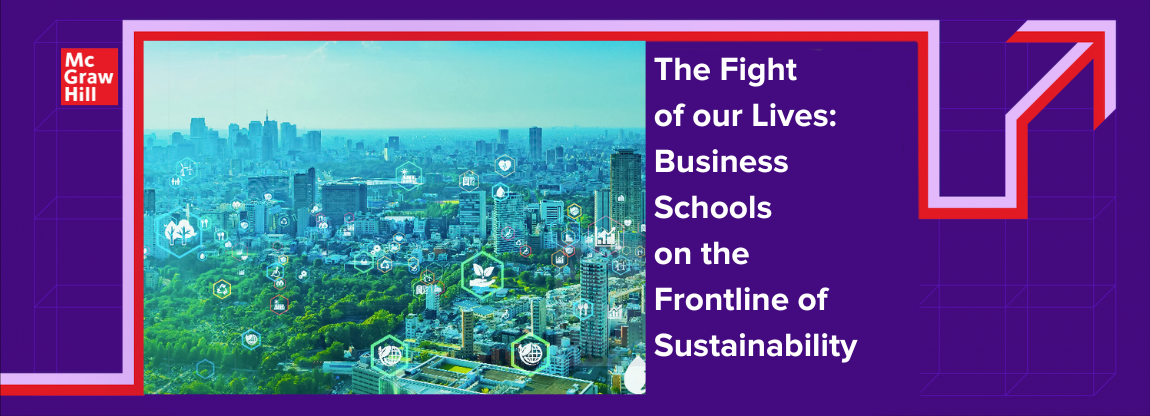The Fight of Our Lives: Business Schools on the Frontline of Sustainability
As members of the Chartered Association of Business Schools swapped thoughts and best practice at their annual conference this year, world leaders were coming together at COP-27, climate activists were bringing the M25 to a standstill, and the METRO front page carried the dire warning that we are facing ‘the fight of our lives’. Unsurprising then, that key themes of this year’s conference were sustainability and leading in turbulent times, with a keynote panel discussion dedicated to transitioning to sustainability.
In a world where a new vocabulary is emerging (see ‘permacrisis’ and ‘polycrisis’), we need to accept that we have permanently shifted to a new reality. “We’re not going back to 2012,” says Hetan Shah, CEO of the British Academy, “this is now normal.”
Business schools need therefore to be looking at what they are teaching, conscious of the pivotal role they play in developing the capabilities and mindset of future leaders. “Thirty years ago, we were talking about economic and social regeneration, but now we’re talking much more fundamentally about what responsibility businesses take for their environmental impact,” says David Grayson CBE, Emeritus Professor at Cranfield School of Management. “We have got to respond to global imperatives – not just climate change but other issues such as biodiversity loss and the challenge of hyper-global inequalities. We need a much more holistic understanding of sustainability.”
Avoiding the false dichotomy between purpose and profit
“The purpose of business is to provide profitable solutions to the problems of people and planet and, crucially, not to make money from doing harm,” says David, quoting Saïd Business School. “This is the mindset we need to inculcate. It is in the tension between purpose and profitability that innovation occurs.”
Hetan Shah agrees: “The Friedman notion of shareholder primacy is looking ragged,” he says, going on to remind us that shareholder value is a relatively recent phenomenon, and that we should be looking at other options and business models.
As David Schofield, Director of Sustainability for Arriva, put it: “It’s not about choosing between the right thing and making money – it’s about innovation, resilience, transition.” He points out that firms who take no action on sustainability risk losing out in the longer term anyway, as more environmentally conscious consumers vote with their feet. And there are huge new business opportunities for those with the right products and services: “We need to keep the tension between purpose and profit,” he says, “not see them as polar opposites. There need to be some fast and radical shifts in the carbon intensive industries, and the companies that enable that will win big.”
What can business schools do differently?
1) Develop the curriculum and course delivery
Perhaps the most obvious strand, there are nevertheless different many different facets to this such as:
- Apprenticeships/ professional accreditation – David Grayson describes how at Cranfield School of Management, they have recently launched a (mostly) online Sustainable Entrepreneurship MBA linked to modern higher-level apprenticeships. Because most of the candidates are already working in sustainability roles in their own institutions, they can take back what they are learning and make an impact immediately.
- Inter and trans-disciplinary working – Hetan points out that wicked problems defy neat compartmentalisation. There’s a good argument for courses that cross traditional disciplinary boundaries, or at least for cooperative projects between departments. Business students need access to a wider variety of cross-disciplinary cases.
- Greater awareness of other business models – If we are to break away from an economic system that promotes shareholder value (and as a by-product of growth at any cost), business schools must get better at teaching alternative business models such as social enterprises, co-ops, companies limited by guarantee, and benefit corporations.


2) Get students thinking about the problems
There is no need to wait until students are already in the workplace to get them thinking about how to practically embed sustainability practices in business. Hetan recommends offering more opportunities for students to work with local entrepreneurs, looking at social organisations as models for business, and encouraging students to view regulation as a positive thing – promoting a positive triangle between state, regulation and business.
3) Aim high
As Director of Sustainability for Arriva, David Schofield has set the goal of the company becoming net 0 by 2040. “I’m not sure how we’re going to get there yet,” he admits, “but I do know that if we wait until it’s black and white it’ll be too late.” He recommends setting ambitious goals in the spirit of shooting for the moon and landing among the stars.
4) Opt in for accountability
Katrin Muff from LUISS Business School and President of the Positive Impact Rating (PIR) Association, which measures student perceptions of governance, culture, learning programmes etc, reminds us that just as consumers have a say in what brands they choose, students also have a choice – and they’re looking for schools that embrace societal purpose and provide a 21st-century education that equips them with the skills to deal with societal challenges. Schools can opt in to the PIR in order to support internal change processes, benchmark with other schools and provide evidence for accreditation reports. https://www.positiveimpactrating.org
5) Partnerships with Business
Business schools should be forming genuine partnerships (not just driven by research funding) with businesses and other parts of society such as NGOs, says Hetan, to co-design research in areas that will have the most impact – and preferably within the shortest amount of time.




Want to know more?
Download the British Academy report: Teaching Purposeful Business in UK Business Schools here.
Visit McGraw Hill Higher Education website: https://www.mheducation.co.uk/higher-education
Permacrisis declared Collins Dictionary word of the year, Helen Busby, BBC News: https://www.bbc.co.uk
How to think about policy in a polycrisis, Financial Times: https://www.ft.com


